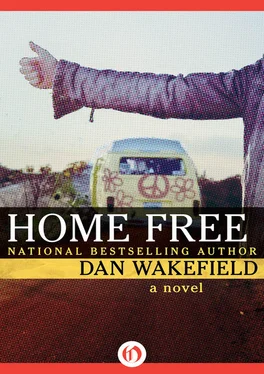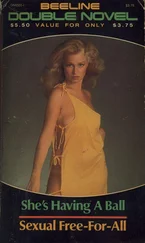Her grave look left and she smiled, big.
“Besides,” he said, serious, “I trust you.”
She nodded.
“It’s hard to explain,” Gene said.
Barnes said he understood.
They were having a beer in a booth at Donnelly’s.
“All I know is, right now it feels good,” Gene said. “It might be over tomorrow or next week or a couple of months, but in the meantime, if it’s good, why not?”
“Sure. Sounds like good medicine.”
“It kind of takes a lot of the bad taste out of me, from everything back to breaking with Lou.”
Barnes said he didn’t mind driving on the rest of the way to L. A. by himself, he’d look for Gene sooner or later. He gave him the phone and address of the producer who’d know where he was, and a check so Gene would have some bread to tide him over, he could pay him back when he got there and landed a job. He insisted. Gene said a couple hundred would be swell. Barnes made it three.
He ordered another round.
“This is the one for the road,” he said.
Gene raised his glass.
“Go west, old man,” he said. “Be well.”
The house, worn by time and weather, well used, useful, personal, rumpled, safe seeming, surrounded by brown fields and guarding trees, going gold now, red, orange, falling, fall. Fall. October. Fires and fog.
Lizzie, bumping up in the beat blue pickup, work boots and corduroy, chestnut hair swinging thick, gravity and grace, then everything shed, warm and milk white and holding, held, instinctive, right, in bed.
The house and Lizzie.
His life.
He’d walked into it like walking up the aisle of a movie and melting into the screen and becoming a part of the picture, the story, finding out what happened as you went along, knowing from the beginning how it would end but not when. Then he’d be standing on the stage feeling silly and strange with the screen dark and the houselights on. Bright. He’d be blinking, trying to find his way out. In the meantime this was his life.
House.
Her.
Sometimes they just stayed in, spending long times in bed. Sometimes they got high and played Chinese checkers with an old set Gene had found stuck behind the organ. Sometimes they sat on the organ bench while Lizzie picked out hymns with one finger and they bellowed out “Leaning on the Everlasting Arms,” “Rock of Ages,” “Abide With Me.” Sometimes Gene cooked, most always stews. Nothing fancy would do. Not the time or place or person. This was stew country, stew weather, and Lizzie a stew lover, hearty, fresh, full.
She took him to parties, nothing like the one he had seen the remains of at Gordo’s place. Gentler.
A turkey dinner one Sunday afternoon in town, a dozen some people sitting on the bare board floor, white angles of sun slanted in. Richie and Marian lived there, he used to be in The Writers Workshop but started his own custom furniture business, she designed and he carpentered and they had two kids, twin towheads, playing through the party. Marian did the turkey; other people brought things to go with it: Brussels sprouts, glazed carrots, mashed potatoes and gravy, mince and apple pies. “This is great,” Gene said to Marian. “What’s the occasion?” “None,” she smiled. “I think they’re the best, don’t you?” He agreed, shifting along the floor till he got himself right in a shaft of sun. Warm. They all were drinking a sweetish wine called Wild Irish Rose. Fine. Just fine.
They were playing Carole King music, warm, friendly things like “Song of Long Ago” and “You’ve Got a Friend,” and then someone put on a new Carly Simon album, and its title song seemed like a personal message to Gene. It was all about how we can’t know what’s coming, we ought to enjoy things now, while we’re together, because—and she belted the line, making him shiver, thrilling to it:
These are the good old days .
Yeh. Now. This moment. He looked at Lizzie, her head back, her mouth slightly open, smiling, her hair lit in the late sun. He wished he could have that moment, keep it, save it, hold it. He squeezed his eyes shut, trying.
Sometimes they watched TV on the big color set in the farmhouse, and always found funny stuff, no matter what was showing. Maybe because they were high. Who knew? Or cared? They watched the old black-and-white movie of The Roaring Twenties with James Cagney, guys machine-gunning one another all over the place, and there was one part where Jimmy and some of his Prohibition henchmen are pouring big jugs of alcohol into a bathtub. Lizzie tapped Gene’s arm for attention.
“Hence the term ‘bathtub gin,’” she said.
“Hence,” said Gene.
It got them giggling, and they kind of adopted the word as their own, working it into the conversation whenever they could.
“Hence.”
Sometimes when Lizzie stayed overnight Gene would ride into town with her the next morning. He’d perk some coffee for them to warm up with and then they’d have one of those knockout truck-stop breakfasts Lizzie loved so much and then she would drop him off on Main Street. He’d stand at the corner across from the Iowa National Bank till he caught the time and temperature, blinked in dull gold bulbs that formed the numbers, and then he set off on his ramble, feeling he had somehow oriented himself, that knowing the time and temperature showed he had his shit together, though it was rare that on these occasions he had any notion of what day of the week or date of the month it was, but what the fuck, you couldn’t be on top of everything. Besides, as the temperature started getting down in the twenties he figured it must be about November.
The University of Iowa was there, of course, but Gene had seen enough of campuses to last him a lifetime, what he dug was the town itself. Of course, it was called Iowa City but to Gene it was a town, that was what he liked about it, the feeling it was small, slow, easygoing. It reminded him of those towns “the boys” came home to in World War II movies. There were old-fashioned hardware and dime stores with wooden floors, bars with billiard tables, diners that served homemade chili, the Epstein Brothers’ homey bookstores where you could browse all day without being hassled. Most of the downtown buildings were small, two and three stories, and after a couple of blocks were the white frame houses with big front porches, an occasional vacant lot, the streets wide, the trees old. Sometimes you’d come upon something that would jerk you back to the sense of the pressurized present, like the anger-dripping red-lettered sign painted on a big board fence that said “Smash Agri-Business Power!” But at least it had the “Agri” in it that kind of gave it an Iowa flavor. He doubted if they’d heard about “Agri-Business Power” in Boston. Maybe Lou had. Oh, well.
Anytime he got depressed he headed straight for Donnelly’s. There were lots of good bars in town but Donnelly’s was the oldest and to Gene’s mind the best. It was dark, with wooden booths, a billiard table at the back, a long mirror that went the whole length behind the bar, like the ones in movie Western saloons, and, to top everything off, a big jar of liquid with some mysterious greenish-yellow objects floating in it that Gene discovered were turkey gizzards. For a quarter you could get a turkey gizzard to munch with your beer! No fancy-pants cocktail dainties in this place. Turkey gizzards. There weren’t many fancy cocktails ordered either, people came to Donnelly’s for serious drinking, mostly beer or shots.
One day in Donnelly’s Gene was telling the bartender how much he dug the place, the bar and the town both, and he learned to his amazement and outrage that it wouldn’t be that way long. Urban renewal was coming. They would even tear down Donnelly’s. Tear it down! Shit, Gene thought it should be a national monument, a fuckin historic site. But it wouldn’t. It would just be a memory. Instead of old wood there’d be plastic here, like anywhere. Gene figured if they could do it way out here in the middle of the country then finally there wouldn’t be any towns left at all, just one big national strip of fast-food, quick-stop, Plexiglas and plastic, an Orange Julius on one end, a Taco Belle on the other, so you would know which coast it was. Along the way there’d be signs to tell you where the towns used to be.
Читать дальше












